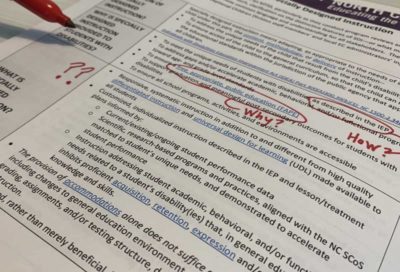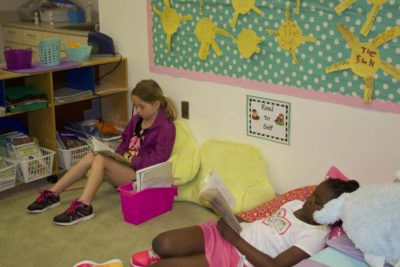

Students with learning differences are 10% more likely to drop out of school compared to their peers. For kids with learning differences who are also students of color or from low-income families — the numbers are worse. Black, Hispanic, and Native American students with learning disabilities, for example, drop out at about a 35% rate.
Nine organizations across the state are focused on reducing disparities and improving education outcomes for this group of students who live at the intersection of race, income, and learning differences. Durham-based MDC is bringing them together for a program called “Learning for Equity: A Network for Solutions,” or LENS-NC for short.
The work will focus on kids who learn differently, often times meaning they have a specific learning disability (like dyslexia) or other health impairment (like Attention Deficit Hyperactivity Disorder) under the Individuals with Disabilities Education Act. The one out of five students with learning differences, says the National Center for Learning Disabilities (NCLD), can thrive under the right instruction.
Too often, however, they are met with stigma. According to an NCLD survey, 33% of educators say that sometimes what people call a learning or attention issue is really just laziness. This can trigger fear among parents, 43% of whom responded to the survey saying they wouldn’t want others to know if their child had a learning disability.
Through a grant from the Oak Foundation, the nine groups will receive more than $1.4 million over 18 months to advance their work to reduce racial and income disparities in educational outcomes among students with learning differences, and to create learning environments where marginalized students with learning differences can thrive.
“LENS-NC seeks to improve the lives of the one in five children who struggle with learning and attention issues,” an MDC press release announcing the initiative states. “And the less than favorable outcomes for the ones who are low-income students and students of color, who face even greater challenges in our educational systems.”
The LENS-NC work looks like periodic convening of the nine groups, sharing of information and ideas, and creating collaborative opportunities. Each group has its own project it seeks to advance. The nine organizations and projects are:
- Center for Racial Equity in Education (Charlotte), which seeks to build educator understanding of equitable practices and learning environments that address bias, and plans to produce an educator-focused playbook for better serving North Carolina students of color with learning differences.
- Disability Rights North Carolina (Raleigh), which seeks to improve educational outcomes and reduce disparities in school exclusion, court referrals, and literacy deficits among students with learning differences statewide who have low-wealth families and/or are students of color and elevate the voices of students and families.
- Education Justice Alliance (Raleigh), which educates, activates, and engages communities of color, with a particular focus on Black and Brown working class people, and is working to create a school-funding coalition that would propose community solutions to unfair school-funding practices.
- El Futuro (Durham), which works with Latinx children and families, particularly on education issues, and plans to enhance supports for Latinx children who have ADHD by developing more culturally informed strategies at the practice- and system-level.
- Exceptional Children’s Assistance Center (Davidson), which works with families, students, and professionals to practice special education advocacy in the context of institutionalized racism, and plans to work with school staff and principals on institutionalized racism and issues specific to students with disabilities.
- Immersion for Spanish Language Acquisition (Chapel Hill), which empowers students, parents, and teachers to engage with one another to support their community as they navigate the educational system and seek better support for their diverse learning needs.
- North Carolina State Board of Education (Raleigh), which plans to develop and implement ARISE NC, an intensive training for school districts experiencing significant disproportionality in identifying children as students with disabilities, placement in educational settings, and incidence of disciplinary removals.
- Rural Opportunity Institute (Tarboro), which will be working with parents, students, and staff at Edgecombe County Public Schools to design, implement, measure, and evaluate the impact of a series of interventions to reduce the impact of trauma and provide opportunities for healing and resilience.
- Student U (Durham), which will continue developing strategies to support marginalized students in Durham, North Carolina, who learn differently, providing multiple one-on-one touch points for students over their 11 years at Student U.
“Our aspiration is that the collective effort to learn and collaborate together will strengthen the work and amplify the reach of each participating organization to advance more equitable outcomes for students with learning differences who experience additional adversity due racism and poverty,” said Heather Graham, learning differences program director for the Oak Foundation.
The network has convened three times so far, hearing keynotes from groups such as National Center for Learning Disabilities and Eye-to-Eye, and then breaking into small groups to understand each other and their various projects better. According to the MDC press release, the focus is on shared learning and amplifying strategies by:
- Building knowledge and understanding of ways to combat structural racism within the education system, with a focus on the identification and support systems for students with learning differences.
- Providing supports to marginalized students with learning differences and their families that increase confidence, self-esteem, and agency.
- Building educator understanding of equitable practices and learning environments that address bias and promote cultural responsiveness in the classroom.
- Influencing systems to embrace and adopt policies and practices necessary for schools to reduce race and income disparities in educational outcomes among students with learning differences.
- Elevating the voices and strengthening the skills of students and families affected by structural racism to advocate for changes to practice, policy, and systems that improve opportunity for marginalized students with learning differences.
The LENS-NC initiative has been in the works for quite some time, and the national mood under which the network ultimately launched is not lost on organizers.
“This work at the intersection of race, educational equity, and learning differences is occurring at a pivotal time in history, when there are numerous discussions about justice and equity in our communities,” said MDC Program Director Stephanie Walker, who is heading up LENS-NC. “In the few months that LENS-NC has been underway, several organizations in the network have forged new alliances to provide assistance to students and parents. As the network continues its work, even more opportunities for partnership will emerge, and we are excited about the possibilities.”
The Oak Foundation supports the work of EducationNC.




